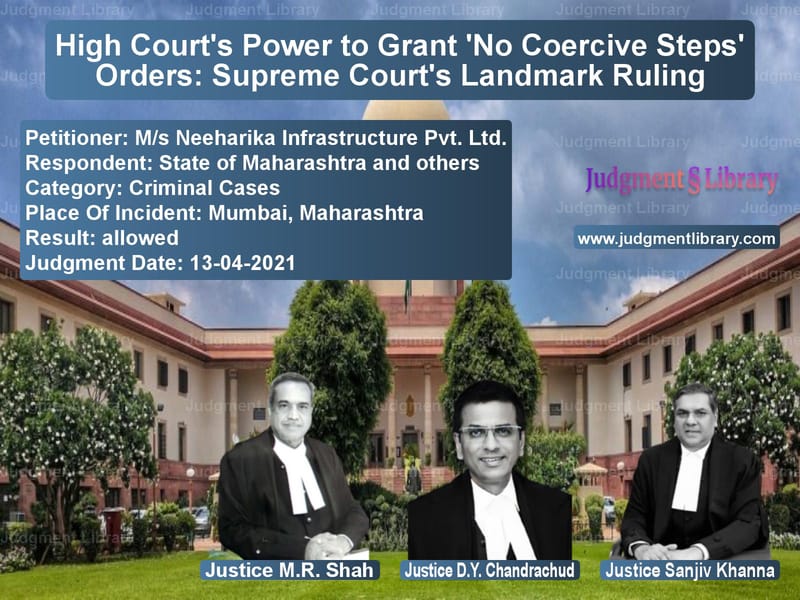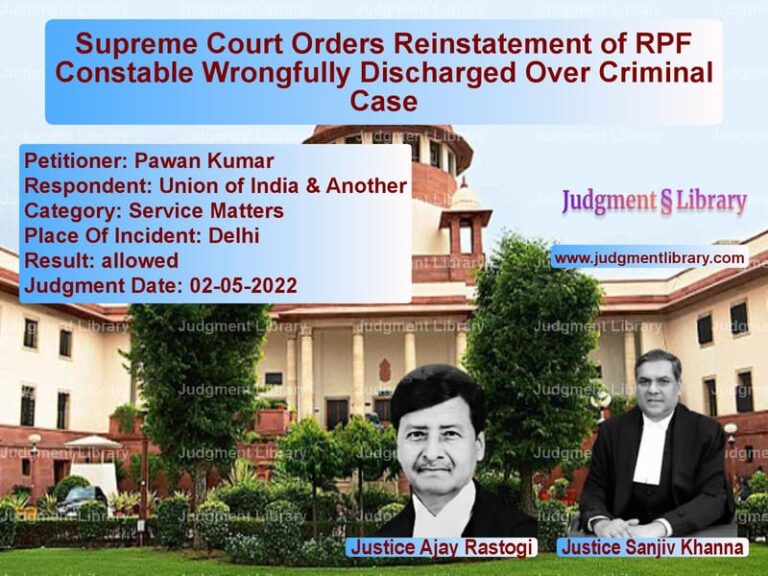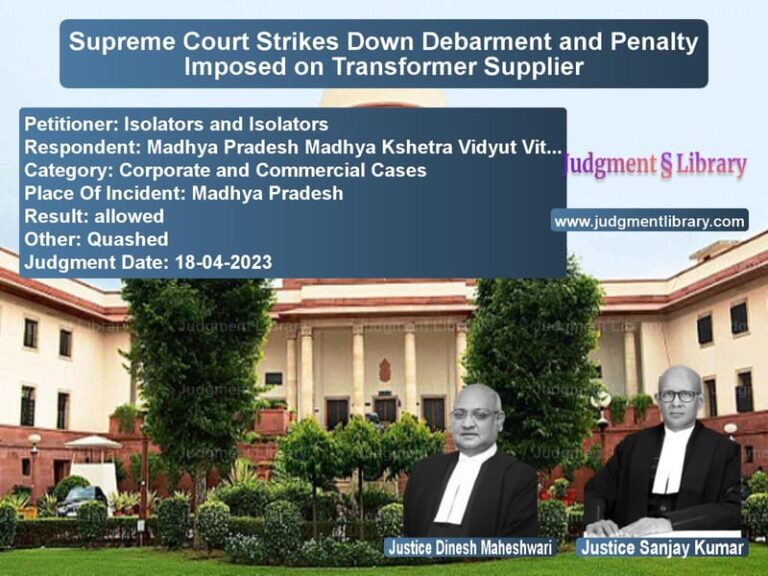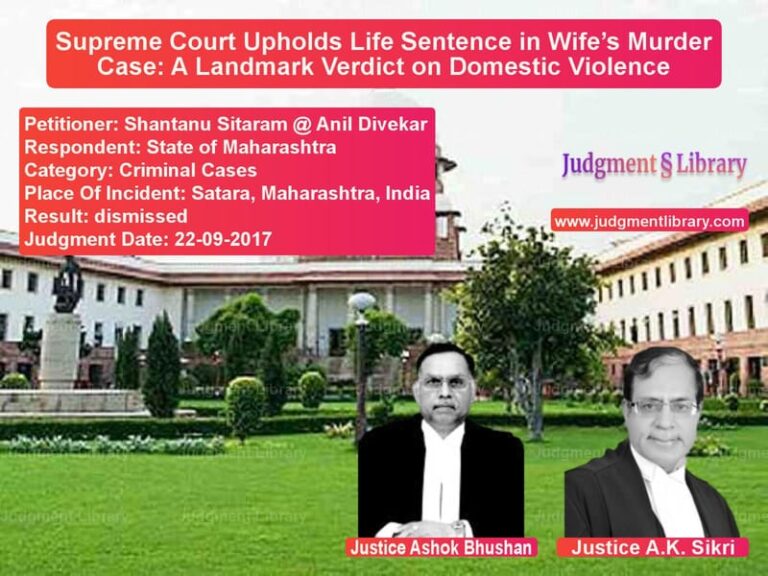High Court’s Power to Grant ‘No Coercive Steps’ Orders: Supreme Court’s Landmark Ruling
The Supreme Court of India recently delivered a significant judgment in M/s Neeharika Infrastructure Pvt. Ltd. v. State of Maharashtra & Ors., clarifying the scope of High Court powers under Section 482 of the Criminal Procedure Code (CrPC) and Article 226 of the Constitution. The Court addressed the issue of whether High Courts can pass blanket orders of ‘no coercive steps’ while dealing with petitions for quashing FIRs.
Background of the Case
The case arose from a dispute where M/s Neeharika Infrastructure Pvt. Ltd. (the appellant) had filed an FIR against certain accused for offenses including forgery, criminal conspiracy, and cheating under the Indian Penal Code. The accused initially secured interim protection from arrest through anticipatory bail. Subsequently, they moved the Bombay High Court seeking quashing of the FIR under Article 226 of the Constitution and Section 482 CrPC. The High Court, while granting time for filing replies, passed an interim order stating that ‘no coercive steps shall be adopted’ against the accused.
Challenging this interim order, the complainant (Neeharika Infrastructure) approached the Supreme Court, arguing that such blanket orders hampered investigation and police powers.
Petitioner’s Arguments (Neeharika Infrastructure Pvt. Ltd.)
- The High Court erred in passing a blanket order of ‘no coercive steps’ without assigning reasons.
- The accused already had interim protection under anticipatory bail, making further relief unnecessary.
- The investigating agency’s right to probe a cognizable offense was obstructed by the High Court’s interim order.
- The High Court did not apply the principles laid down by the Supreme Court in State of Haryana v. Bhajan Lal and other precedents.
- Such orders weakened the criminal justice process by allowing accused persons to evade scrutiny.
Respondent’s Arguments (State of Maharashtra and Accused)
- The High Court had wide discretionary powers under Article 226 and Section 482 CrPC to prevent misuse of legal processes.
- The accused were facing a frivolous FIR that sought to convert a civil dispute into a criminal case.
- The police were conducting a one-sided investigation, and without judicial protection, the accused would suffer harassment.
- Courts have previously held that ‘no coercive steps’ orders can be granted to prevent arbitrary action by the police.
Supreme Court’s Analysis and Judgment
The Supreme Court undertook an extensive analysis of judicial precedents on quashing FIRs and the power of High Courts under Article 226 and Section 482 CrPC. The Court emphasized the need for a balance between preventing abuse of process and ensuring that police investigations are not obstructed.
Read also: https://judgmentlibrary.com/supreme-court-grants-bail-in-terror-funding-case-key-legal-takeaways/
The Court made the following key observations:
- “Police have a statutory right and duty under the Code of Criminal Procedure to investigate cognizable offenses. Courts should not thwart such investigations without strong reasons.”
- “High Courts must exercise their inherent power under Section 482 CrPC or Article 226 of the Constitution sparingly and with due caution.”
- “Blanket orders of ‘no coercive steps’ hamper criminal investigations and should not be granted without specific justification.”
- “Courts should refrain from interfering in investigations unless there is clear evidence of abuse of process or manifest injustice.”
The Court categorically ruled that the order passed by the Bombay High Court was unsustainable. It set aside the ‘no coercive steps’ direction and reiterated that such orders should not be granted casually.
Guidelines Issued by the Supreme Court
The Court laid down the following guidelines for High Courts while dealing with petitions under Section 482 CrPC and Article 226:
- High Courts should not routinely grant orders restraining arrest or investigation.
- Any order staying investigation must be based on sound legal reasoning and exceptional circumstances.
- ‘No coercive steps’ orders should be specific and not vague or general.
- Accused persons seeking protection from arrest should apply for anticipatory bail under Section 438 CrPC.
- The High Court should not pass such interim orders while dismissing quashing petitions.
Impact of the Judgment
This ruling is a significant precedent in preventing misuse of judicial discretion in criminal matters. It reinforces the autonomy of investigating agencies and prevents accused persons from obtaining blanket protection that may obstruct the legal process.
For law enforcement agencies, this judgment restores their investigative authority, ensuring that criminal investigations proceed without undue interference.
For accused individuals, the ruling underscores that protection from arrest must be sought through statutory provisions such as anticipatory bail rather than blanket judicial orders.
The ruling serves as a strong warning against arbitrary exercise of judicial discretion that hampers criminal investigations.
Conclusion
The Supreme Court’s decision in M/s Neeharika Infrastructure Pvt. Ltd. v. State of Maharashtra is a crucial step in maintaining the balance between personal liberty and the need for effective criminal investigation. It reaffirms that judicial intervention in ongoing investigations should be minimal and guided by established legal principles.
This judgment will likely serve as a guiding precedent for future cases where accused persons seek protection from arrest under the guise of quashing petitions. It ensures that courts do not act as obstructions in the legal process but instead uphold the rule of law by permitting fair and transparent investigations.
Petitioner Name: M/s Neeharika Infrastructure Pvt. Ltd..Respondent Name: State of Maharashtra and others.Judgment By: Justice M.R. Shah, Justice D.Y. Chandrachud, Justice Sanjiv Khanna.Place Of Incident: Mumbai, Maharashtra.Judgment Date: 13-04-2021.
Don’t miss out on the full details! Download the complete judgment in PDF format below and gain valuable insights instantly!
Download Judgment: ms-neeharika-infras-vs-state-of-maharashtra-supreme-court-of-india-judgment-dated-13-04-2021.pdf
Directly Download Judgment: Directly download this Judgment
See all petitions in Bail and Anticipatory Bail
See all petitions in Fraud and Forgery
See all petitions in Extortion and Blackmail
See all petitions in Judgment by Mukeshkumar Rasikbhai Shah
See all petitions in Judgment by Dhananjaya Y Chandrachud
See all petitions in Judgment by Sanjiv Khanna
See all petitions in allowed
See all petitions in supreme court of India judgments April 2021
See all petitions in 2021 judgments
See all posts in Criminal Cases Category
See all allowed petitions in Criminal Cases Category
See all Dismissed petitions in Criminal Cases Category
See all partially allowed petitions in Criminal Cases Category







